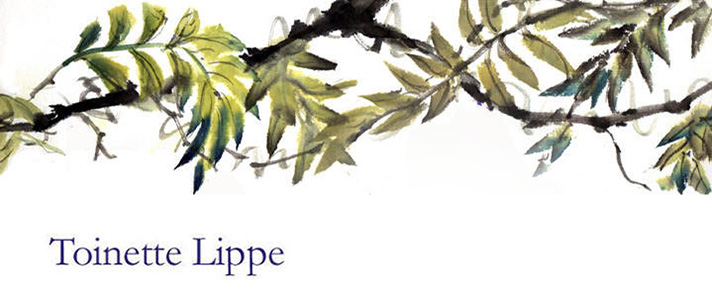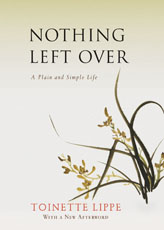
Nothing Left Over
A Plain and Simple Life
 This book on “interior housekeeping” illuminates the true measure of a life lived in terms of usefulness and impeccability rather than accomplishment or possessions. With subtle wit, wonderfully evocative language, and clear-eyed wisdom gleaned from her own experience, Toinette Lippe teaches us how to discern what is essential and let go of what is not. Her brilliant meditation shows us how to move through the day with integrity, elegant economy, and grace.
This book on “interior housekeeping” illuminates the true measure of a life lived in terms of usefulness and impeccability rather than accomplishment or possessions. With subtle wit, wonderfully evocative language, and clear-eyed wisdom gleaned from her own experience, Toinette Lippe teaches us how to discern what is essential and let go of what is not. Her brilliant meditation shows us how to move through the day with integrity, elegant economy, and grace.
Paperback: $14.95
E-book: $7.95
You can buy the paperback from me, Amazon, Barnes and Noble, or support your local bookstore by purchasing through IndieBound.
You can buy the ebook from Kindle, Nook, IndieBound, or Apple.
Toinette Lippe is a woman whose wisdom is as deep as it is unassuming. The ideas in Nothing Left Over are seeds bursting with vitality and her book is a primer in grateful living. As you come to know her in a delightful intimacy, you come to know yourself from unsuspected perspectives.
Brother David Steindl-Rast, author of Gratefulness
A magnificent piece of writing. Toinette Lippe's lucid memoir puts into practice what we all intuitively know makes sense but somehow never quite get round to doing.
Stephen Batchelor, author of Buddhism Without Beliefs
Toinette Lippe offers us an antidote for what ails us, an honest and wise prescription for living well. Nothing Left Over is an important book for anyone who has ever wondered what really matters.
Rachel Naomi Remen, M.D., author of Kitchen Table Wisdom
I can think of no greater praise than to say this is an honest book; it helps us understand what the values of “simple living” are really meant to impart in a complicated and unsimple world, not just theoretically, but in the details of our everyday existence.
Jacob Needleman, author of The American Soul
Toinette Lippe has used her marvelous gift of word imagery to make her point that a lifetime of simply complete moments emerges as a very full life indeed.
Sylvia Boorstein, author of It's Easier than You Think
In spare, engaging prose, Toinette Lippe—a noted publisher, teacher, and founder of her own imprint, Bell Tower—explores the “vast difference between necessity and desire” and the rewards of a life stripped to basic pleasures and principles. From a boss who offers a new spin on being present (“We don't pay you to work here. We pay you to be here”) to her study of Japanese brush painting (an art whose aim is “the elimination of the inessential”), her experiences help us understand—and even reshape—our own.
One Spirit Book Club
Elders in indigenous societies reach a certain point in their lives when they want to pass on the wisdom they have accrued over the years. To do this, they travel down memory lane and share their experiences with others. Early on in this philosophical memoir, Lippe notes: “I have been mulling over the word content. I find it wonderful that it means both ‘that which is contained‘ and also ‘being satisfied.‘ Both meanings come from the past participle of the Latin verb continere. Contentment is a peaceful and unruffled state, but nowadays it is all too rare.” Read Nothing Left Over slowly in a quiet place. Let it lead you to do some interior housekeeping. Live with those changes for a while, and then return to the book for another gentle suggestion, and then another, about what it really means to be contained and satisfied.
Frederic and Mary Ann Brussat, Spirituality & Health
Toinette Lippe‘s hand is light: no melodrama. Experience has taught her a good deal about keeping things simple, cultivating equanimity, and developing an appetite for the present moment. Nothing Left Over reveals an independently won spiritual maturity.
Andrea McQuillin, Shambhala Sun
The author of this guide to the everyday world is a rather remarkable person, Toinette Lippe, one of the most respected editors of spiritual books in America, and another facet of the book is her own autobiography in publishing, beginning as secretary to André Deutsch in London, crossing to these shores to work with Bob Gottlieb at Knopf, and on to her founding of Random House's spiritual imprint, Bell Tower, which she continues to run to this day.
So the book alternates between pithy paragraphs of wisdom (“There are only details. There isn't anything else. If you step onto a bridge and don't look where you are going, you may lose your footing and plunge into the water…. The first person we have to tell the truth to is ourselves. If we are not going to be honest with ourselves, there is little possibility that we will treat anyone else differently.”) and an eyewitness account of what spiritual publishing actually is.
“What I try to do is supply readers with something vital to body, mind, or heart, and what I see as my function is to supply this something in its most appropriate form to all those who really need it…. One of my criteria for selecting a book for publication is whether what the author has written in the manuscript changes my own spiritual practice. If it can do that for me, I believe it can do the same for others.”
David Rothenberg, Parabola
The great pleasure of Nothing Left Over is exactly in its honesty and attention to detail, which flow from Toinette Lippe's life to her writing and back again. I encourage you to listen to her plain and heartfelt words as I did, and to consider the mysterious and ordinary lessons within: find balance and travel light.
Alan Senauke, Inquiring Mind
“Less is more” has long been an adage embraced by those looking to scale back. But as Toinette Lippe points out, the emphasis of this phrase is on “more,” with more preferable to less. For the author, this simply won‘t do as a maxim. When she suggests “Less is enough” as a substitute, we immediately sense that she has carved out her own way in the world. As a result, she has some valuable insight to share.
The stories Lippe uses to illustrate these lessons are often presented in a casual tone, as if the author jotted down whatever anecdote came to mind while sitting in front of her computer. This is the elegance of the book: the idea that any moment contains all we really need to know in order to live simply and plainly; every instance presents an opportunity to refine our awareness so that we can be present and of service to others.
Paul W. Morris, Turning Wheel
Toinette Lippe's memoir speaks to living with full-tilt generosity and joy while not clinging to material clutter, resentments, and unfulfilled passions. “In truth, it is not the number of and diversity of our possessions that is the problem but our attachment to them.... The freedom we are all seeking is the freedom from the fear of losing what we believe we own.” Like the gentle, intelligent voice in Gift from the Sea, Lippe contemplates the stories of her life as she passes on humble advice and observations.
Gail Hudson, Amazon.com
Although she provides sound advice for living without the unnecessary and suggestions for traveling light, spring cleaning, and shopping and eating mindfully, Lippe‘s real focus is “not so much about what needs to take place at the physical level... as about what goes on in the mind.” Lippe offers readers an unusually authentic perspective. Professing “I don‘t like agony,” her voice is refreshingly unsentimental for this genre, self-aware and down-to-earth.
Publishers Weekly
![]()